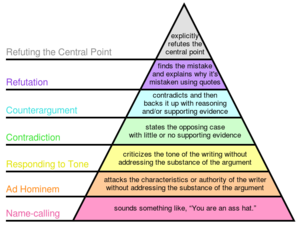Difference between revisions of "Hierarchy of truth"
| Line 6: | Line 6: | ||
[[File:Graham's Hierarchy of Disagreement.svg|thumb|a hierarchy of validity in methods of disagreement with a statement or claim]] | [[File:Graham's Hierarchy of Disagreement.svg|thumb|a hierarchy of validity in methods of disagreement with a statement or claim]] | ||
==About== | ==About== | ||
| − | The [[hierarchy of truth]] is a guide for evaluating the credibility of any conclusion about [[truth/objective|objective reality]] based on the methodology used in reaching it. | + | The [[hierarchy of truth]] is a guide for evaluating the credibility of any conclusion about [[truth/objective|objective reality]] based on the methodology used in reaching it. It might more precisely be described as a hierarchy of [[truth/evidenced|''evidenced'' truth]], as opposed to other [[truth|types]]. |
===The List=== | ===The List=== | ||
From most to least reliable, with abbreviations for easy reference: | From most to least reliable, with abbreviations for easy reference: | ||
Latest revision as of 15:22, 1 January 2022
About
The hierarchy of truth is a guide for evaluating the credibility of any conclusion about objective reality based on the methodology used in reaching it. It might more precisely be described as a hierarchy of evidenced truth, as opposed to other types.
The List
From most to least reliable, with abbreviations for easy reference:
- [RVH] repeatedly verified hypothesis
- [VHY] verified hypothesis
- [HYP] hypothesis: sound reasoning taking into account all known evidence
- [CON] conjecture/speculation: a conclusion based on a subset of available evidence. "It might be that this is the case, if certain things were found to be true."
- [GUE] guessing: an attempt to state a conclusion which might match reality, without attempting to check it against all evidence
Science
Scientific papers generally can be cited as strong support for a truth. Within a debate context, it's fair to categorize a given paper as VHY or better by default, but bad science does exist. Science papers are fair game for criticism, like anything else, and that may be cause to downrank them. Among the many reasons that a science paper's findings may be downranked are:
- biased selection of subjects (observed trends may have been caused by how the subjects were selected and not reflect overall trends)
- small sample-size (too few data-points; results may reflect statistical fluctuation)
- bad logic (the conclusions stated are not supported by the evidence presented)
It's also important to distinguish between science papers and science reporting. The latter often exaggerates the significance of findings (in order to attract readers) or even blatantly misunderstands the subject-matter.
Further, it should be noted that there are a handful of subjects over which the science is very settled (RVH) and yet over which there is or has been political controversy, often claimed to be scientific in basis. For example:
- global warming
- evolution by natural selection
- the shape of the earth
Flat Earth theories are an especially good example of how "controversy" can be generated despite the most direct and inarguable evidence plus literal millennia of accumulated observations and less-direct evidence all clearly pointing towards the same conclusion.
